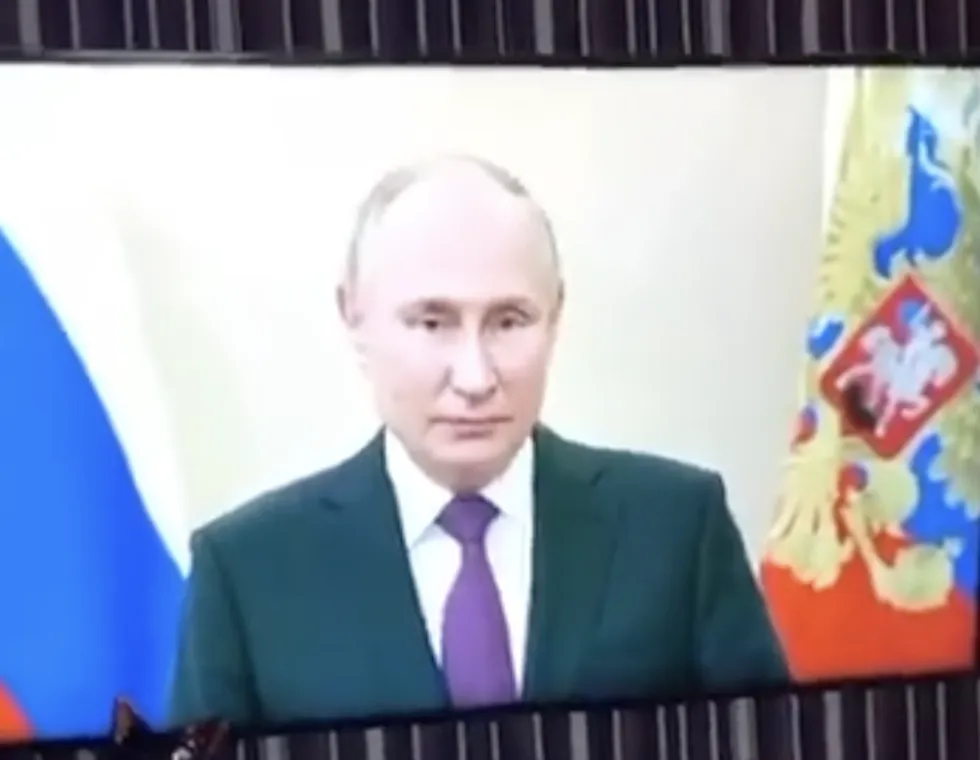By: Sam Doak
June 7 2023
 Image source: Twitter
Image source: Twitter
“Today I will sign a decree on a full-scale mobilization, because to prevail over the dangerous and subtle enemy, we need to unite all forces of the Russian Federation.”
On June 5, 2023, Russians in Belgorod, Rostov, and Voronezh watched and listened as Vladimir Putin seemingly announced a general mobilization, something that many have feared since the early months of the country’s war with Ukraine. Aired through television channels and radio stations operated by Mir, a public broadcaster headquartered in Moscow, the message told listeners that martial law had been instituted. Residents of these regions, all of which border Ukraine, were warned of incursions by “Ukrainian troops armed to the teeth by NATO,” and told efforts were underway to evacuate civilians to the country’s interior.
While the “President's emergency appeal” broadcast on Monday night likely alarmed viewers and listeners, it quickly became clear that it was fake. Responding to questions concerning the incident, Kremlin spokesperson Dmitry Peskov told state media that hackers were responsible for airing the deceptive message and that the Russian government had taken control of the affected broadcasters.
The fake message was broadcast at a particularly tense time. For some time now, Russians and international observers have been expecting a long-awaited counteroffensive from Ukrainian forces in an effort to recapture occupied territory. While Kyiv has thus far declined to announce the onset of this push, preparatory efforts appear to be well underway at the very least, with Ukrainian forces having reportedly advanced across several locations in recent days.
While the specter of an imminent counter-offensive would likely be enough on its own to elicit anxieties, recent events in Belgorod Oblast have caused the war to appear closer to home for many Russians. Since late May, anti-Kremlin armed groups have repeatedly clashed with Russian forces in the region, constituting the most sustained engagements to occur on the country’s territory since it launched its full-scale invasion in 2022.
In their coverage of Monday’s fake “President's emergency appeal,” many outlets have characterized the recording as a “deepfake.” Strictly speaking, this term refers to when media is manipulated using tools powered by artificial intelligence. In this instance, not enough is known about how the video was created to definitively state that this is the case.
Whatever tools were used to create it, from the imperfect footage that is currently available, it appears as though the fake was reasonably well executed. Some details appear unusual, like seemingly disappearing wrinkles; however, it seems unlikely that viewers would have picked up on these small imperfections, particularly when broadcast on a trusted medium such as a television channel.
To date, little is known about how exactly these recordings found their way to Russian audiences. While the consensus appears to be that either the Ukrainian state or a sympathetic third party is behind the incident, nothing has been proven as of yet.
As with the identities of those responsible, the precise objectives of this operation are not yet publicly known. Commenting on the likely rationale behind the action, Kyle Walter, Head of Research and Insights at Logically, stated, “In all likelihood, this type of attack seeks to undermine psychological stability within the domestic Russian population.”
According to Walter, the choice to broadcast the message through the mediums of television and radio is significant. On this, Walter told Logically Facts, “One of the most interesting things to take away is that in many places, there is still an assumption that what's presented to you on official television or radio channels is verified and accurate. Particularly in a country like Russia, where both of these types of outlets are heavily regulated and there are penalties in place for sharing opinions critical of the military, for example, the established trust in traditional media is even higher.”
Colonel Phillip Ingram, a former senior military intelligence officer, offered a similar assessment, opining that such efforts have the potential to affect public trust inside Russia. Ingram told Logically Facts, “Russians are getting 100% of their information virtually from state-controlled media outlets, and if one of those outlets has been duped, that can send a message out to the Russian people saying, ‘actually, this was wrong, maybe they'll start to question some of the other stuff that they’re hearing.’”
As the exact aims of the people responsible for the broadcast are unknown, it is not fully possible to assess how successful this particular operation was. It is true that a significant number of Russians are likely to have heard the message, but it does not seem as though this led to any tangible real-world chaos or mass hysteria.
On the tangible effects of this effort, Walter told Logically Facts, “From what we can see on bigger Russian Telegram channels, it doesn't appear that it caused mass confusion or panic. Claims that it caused panic in the border regions, which have been targeted by raids from the Russian Volunteer Forces and Freedom of Russia Legion, are difficult to confirm, but it is possible given they have been under shelling and attacks for weeks.”
According to Colonel Ingram, the admission that false information was aired by such organizations has, at the very least, the potential to alter perceptions in the long term. On this, he told Logically Facts, “People who are trusting 100 percent in television outlets and Russian news are going to go ‘hang on, but I believed that. How much else that's coming through is fake? And how much are they not telling me?’ So from a success perspective, that was quite a good success.”
Whether we will see similar operations as the war in Ukraine progreses is unclear. For a long time now, the technology required to create convincing fakes of this nature have been widely available. The ability of anti-Kremlin actors to distribute such media through traditional channels, however, is not a given.